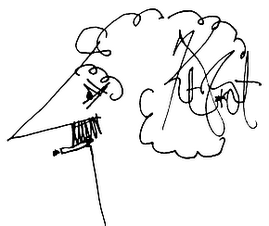Excerpt and link below:
A N I N T E R V I E W W I T H
K U R T V O N N E G U T ,
BY J. RENTILLY
Q: It is a weird moment in history, don't you think?
Kurt Vonnegut: Well, my late brother Bernie, who was a great expert on weather — at one point he knew more about tornadoes than anybody else on the planet, I imagine — was always approached by people who knew his background and wanted him to be an expert about it. "Bernie, isn't this weather unusual?" And he would say, "The weather is always unusual." I mean, this is a very special time in history, but every time is.
Q: I enjoyed God Bless You, Dr. Kevorkian very much.
Vonnegut: Well, that's nice.
Q: You spend the entire book going back and forth between this mortal coil and the afterlife.
Vonnegut: Oh, it's just a short book. A pamphlet, really.
Q: Well, in your pamphlet, then, you spend a good deal of time talking with the dead. What do you think we can learn from those who have bailed-out before us?
Vonnegut: Well, there were — or maybe there are — a number of dead people out there. [Laughs] It's a very crowded place. There is a Beethoven and a Shakespeare and a Hitler and an entire family out there. But, fortunately, you don't have to go to Heaven to talk to some of them. A lot of them have left us amazing things on paper, and so their lives persist here anyway. Wonderful words. Beautiful music. Stunning things that resonate. I am, as we talk, quoting Shakespeare. I'm writing about the death of eloquence. Eloquence was so ordinary back then, in the time of Shakespeare. In contrast to Shakespearean speech, I was watching one of those television talk shows the other night where people air their disagreements with other people. There is a scene in Othello where Iago wants to get Cassio drunk on alcohol and.... Well, wait. Do you want to hear it?
Q: Sure.
Vonnegut: Hold on. I'll get it. [Long pause, papers shuffling] Okay. I've got it. So Iago says, "Come, lieutenant, I have a stoup of wine; and here without are a brace of Cyprus gallants that would fain have a measure to the health of black Othello." Cassio turns down the drink and says, "Not tonight, good Iago; I have very poor and unhappy brains for drinking: I could well wish courtesy would invent some other custom of entertainment." And then we get back to what I saw the other guy say on tv — well, I read his lips actually, because we don't get anything real on our televisions. And this talk show guy said, "Fuck you — you know what I'm saying?" [Laughs] I just don't think people get off on language anymore. Language used to be an elevated art. It used to be for people what music can be. But people don't learn to do that anymore, so eloquence is merely a matter of waste now. Who needs a good vocabulary and proper English? Eloquence — it's dead and who needs it? We use shorthand nowadays. Fuck you — you know what I'm saying? [Laughs]
Q: By way of eloquence, you've said that you write in the voice of a child. Do you think —
Vonnegut: Well, that makes me readable in high school. Not too many big sentences. But I hope that my ideas attract a lively dialogue, even if my sentences are simple. Simple sentences have always served me well. And I don't use semicolons. It's hard to read anyway, especially for high school kids. Also, I avoid irony, too. I don't like people saying one thing and meaning the other. Rest here
Sunday, May 27, 2007
Subscribe to:
Post Comments (Atom)


No comments:
Post a Comment